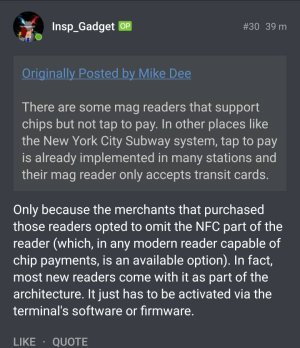Mike Dee
Ambassador
I'm only guessing here, but as the tech evolves more to touch recognition technology, we may see magstripes disappear. That may take awhile but I think that's where we are headed.Yeah, I remember thinking it wasn't a big deal until I actually started using it with my S8+. Everybody assumes it's Apple Pay because Apple advertises Apple Pay a good bit. If Samsung started making commercials for it again I think people might use it more. I still have some cards that don't support Samsung Pay so I still have to carry my wallet for those cards and my drivers license.
I have one card that supports Samsung Pay that I've had registered on a past device that refuses to work on my Note 10+. The card company says it's provisioned on their end, and has done it several times, but it just won't go through. I have a theory that I've just had the same card registered on too many devices in the past few years between iPhones, Apple Watches, Android, and my Samsung watches, but the reps say that shouldn't be a problem.





